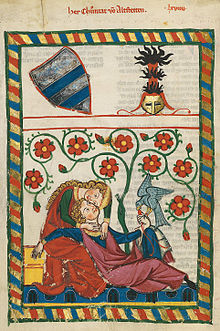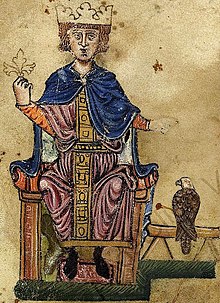Bibliotheca Palatina



The Bibliotheca Palatina (lat., Palatinate Library) in Heidelberg was one of the most important German libraries of the Renaissance with extensive holdings of medieval manuscripts and early prints ( incunabula ). Most of the holdings are now in the Vatican Apostolic Library , the German manuscripts in the Heidelberg University Library .
history
On Elector Ludwig III. The founding of the monastery library at the Heiliggeistkirche in Heidelberg, which formed the core of the later Bibliotheca Palatina , goes back to the Palatinate (ruled 1410–1436) . But it was not until Elector Ottheinrich (r. 1556–1559) united the book holdings of the university, the monastery library in the Heiliggeistkirche and the palace library of the Electors of the Palatinate into the actual Bibliotheca Palatina . Among the holdings were the Lorsch Gospels from the court school of Charlemagne , the Codex Manesse ( cpg 848) and the Falkenbuch ( cpl 1071) of Emperor Friedrich II. With the unification of the book holdings , Ottheinrich created together with the introduction of the Reformation in the Electoral Palatinate and the transformation of the University of Heidelberg into a Protestant state university a Protestant center of teaching. Based on the model of the University of Wittenberg , an extensive library was available, which, in contrast to the Wittenberg's, was not located in the castle but in the city, in the galleries of the Heidelberg Church of the Holy Spirit, which made access easier for teachers and students. After the death of Ulrich Fugger (1526–1584) from Augsburg , 86 other manuscripts, some of them very famous, passed into the library's possession, such as the Otfrid manuscript (cpl 52) and the illuminated manuscript of the Sachsenspiegel (cpg 164). With such important manuscripts, the Bibliotheca Palatina had the character of an unofficial imperial library and was at the time of its heyday - after the acquisitions of the 16th century - as the "mother of all libraries".
Especially because of the extensive collection of theological (predominantly Protestant) literature, Catholics regarded it as the refuge of heresy . When the Electoral Palatinate was conquered by troops of the Catholic League under Tilly in August 1622 , the Bavarian Duke Maximilian I wanted to take the famous library with him to Munich , but Pope Gregory XV had to take it . left at his express request. Only the Ottheinrich Bible and a superb choir book by Ottheinrich made it to Munich. From December 1622 the transport to Rome was organized by the papal envoy and later librarian of the Vaticana, Leone Allacci (1586–1669). Selected books from other Heidelberg libraries, such as the Elector's private library, the university library, the electoral chancellery and the private library of Jan Gruter , the last librarian of the Palatina, were also taken along and transported over the Alpine passes to Italy on the back of 200 mules .
In August 1623 the Bibliotheca Apostolica Vaticana took over 184 boxes with 3,500 manuscripts and 12,000 prints, most of which had been stripped of their bindings to reduce weight (Allacci kept 12 more boxes for himself). They were incorporated again in the further course of the 17th century. Since Ottheinrich had already had many of his books rebound, there are hardly any bindings from before 1550 to be found in the Palatina.
Due to agreements made during the Congress of Vienna in 1816, the German manuscripts could be returned to the Heidelberg University Library . All the prints and the foreign language manuscripts are still in Rome today. The German-language medieval manuscripts ( Codices Palatini germanici ) today form a relatively closed and historically significant collection.
Only a few hundred volumes that were considered to be duplicates remained in Germany. There they found their way to various libraries. In 1998, 67 volumes of the Bibliotheca Palatina were discovered in the University and City Library of Cologne . The Scientific City Library Mainz has significant remnants of the Bibliotheca Palatina, which were transferred from Heidelberg to Mainz after the Peace Treaty of Westphalia was signed. Before that, they were part of the Heidelberg Jesuit Library. In Mainz, the copies were distributed to the libraries of the Jesuit College and the Novitiate of the Upper Rhine Jesuit Province. The outstanding palatines in Mainz include 63 examples from the provenance of Elector Ottheinrich ; they are divided between the city library and the Gutenberg Museum. Extensive holdings from the libraries of the subsequent Palatinate electors have also been preserved in the city library. Specimens from the previous possession of Ulrich Fugger (1526–1584), Achilles Pirminius Gasser and numerous other scholars from the Electoral Palatinate should also be emphasized . The rest is still kept in the Vatican today. For the 600th anniversary of the Ruprecht-Karls-Universität Heidelberg in 1986, many books came back to their old location for a one-off exhibition.
Historical directories
The library in Heidelberg's Heiliggeistkirche was cataloged in 1581. Before being transported across the Alps, Allacci numbered the codes for his own directory and assigned a cap number that identified the respective transport box. For example, Allacci assigned the number "1328" and the Capsan number "C 169", which designated the 169th transport box, for the times of the day (cpg 440) from the Frankenthal scriptorium . "C 169" and "1328" were noted here in ink on the book cover.
digitalization
The German manuscripts in the Bibliotheca Palatina were completely digitized by 2009 and made available online. The prints have been available as microfiches in Germany since 1996. In cooperation with the Vatican and funded by the Manfred Lautenschläger Foundation , the Latin codices of the former Palatine Library, which are located in the Biblioteca Apostolica Vaticana, were also digitized between 2012 and 2018.
Catalogs
- Leonard Boyle (Ed.): Bibliotheca Palatina, publications, microfiche edition, Munich 1989–1995, ISBN 3-598-32880-X (complete works), ISBN 3-598-32919-9 (index)
- Elmar Mittler (Ed.): Bibliotheca Palatina, publications, catalog for the microfiche edition, volume 1–4, Munich 1999, ISBN 3-598-32886-9
- Enrico Stevenson: Inventario dei libri stampati palatino-vaticani, ed. Per ordine di SS Leone XIII PM, 4 volumes, Rome 1886–1891
- Enrico Stevenson: Codices manuscripti Palatini Graeci Bibliothecae Vaticanae descripti praeside IB Cardinali Pitra episcopo Portuensi SRE bibliotecario, Rome 1885
- Enrico Stevenson: Codices Palatini Latini Bibliothecae Vaticanae descripti praeside IB Cardinali Pitra episcopo Port. SRE bibliothecario, Rome 1886
- The medical manuscripts of the Codices Palatini Latini in the Vatican Library, described by Ludwig Schuba, Wiesbaden 1981, Dr. Ludwig Reichert Verlag (catalogs of Heidelberg University Library 1), ISBN 3-88226-060-2 ( digitized version )
- The Quadrivium manuscripts of the Codices Palatini Latini in the Vatican Library, described by Ludwig Schuba, Wiesbaden 1992, Dr. Ludwig Reichert Verlag (catalogs of Heidelberg University Library 2), ISBN 3-88226-515-9 ( digitized version )
- The historical and philosophical manuscripts of the Codices Palatini Latini in the Vatican Library (Cod. Pal. Lat. 921-1078), described by Dorothea Walz, Wiesbaden 1999, Dr. Ludwig Reichert Verlag (catalogs of Heidelberg University Library 3), ISBN 3-89500-046-9 ( digitized version )
- The humanistic, Trivium and Reformation manuscripts of the Codices Palatini latini in the Vatican Library (Cod. Pal. Lat. 1461-1914), described by Wolfgang Metzger, Wiesbaden 2002, Dr. Ludwig Reichert Verlag (catalogs of Heidelberg University Library 4), ISBN 3-89500-214-3 ( digitized version )
- for catalogs of the German manuscripts see Codex Palatinus Germanicus
literature
- Elmar Mittler (Ed.): Bibliotheca Palatina. Catalog for the exhibition from July 8 to November 2, 1986 in the Heiliggeistkirche Heidelberg. 2 volumes. Heidelberg 1986 ( Heidelberger Bibliotheksschriften. 24). ISBN 3-921524-88-1
- Ludwig Schuba: The medical manuscripts of the Codices Palatini Latini in the Vatican Library. Wiesbaden 1981 (= catalogs of the Heidelberg University Library , 1).
- Ilse Schunke : The bindings of the Palatina in the Vatican Library. 3 volumes. Città del Vaticano 1962.
- Frank Thadeusz: Mission nuclear bunker. A German historian recaptured a library from the Vatican that a Pope once had robbed . In: Der Spiegel . No. 40 , September 28, 2019, p. 118 .
- Augustin Theiner : The donation of the Heidelberg library. Munich 1844 ( digitized from Google Books ).
- Friedrich Wilken : The history of the formation, robbery and destruction of the old Heidelberg book collections. Heidelberg 1817 ( digitized version of the Heidelberg University Library).
- Gunter Quarg: Heidelbergae nunc Coloniae: Palatine volumes of the University and City Library of Cologne . Cologne: University and City Library, 1998 (Small publications from the University and City Library of Cologne; 4). ISBN 3-931596-11-7 .